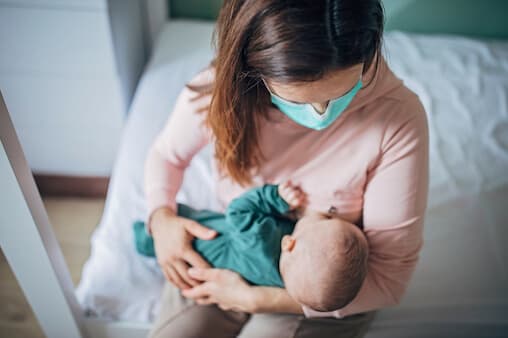Caring for Babies and Small Children During COVID-19

The good news is emerging evidence shows that coronavirus affects children and babies the least out of all age groups. While there have been a small number of newborns who have contracted the disease, it is extremely rare. In these cases, it’s impossible to tell, as yet, if the virus was contracted in utero, or shortly after birth.
Babies and COVID: The Breastfeeding Question
Many mothers are wondering if they should continue breastfeeding if they are showing symptoms of illness. Traditionally, in cases of common influenza, encouraging a baby to breastfeed even when the mother is sick has the effect of increasing immunity in the child. Breast milk, rich in vitamins, minerals, and antibodies, does a much better job of keeping a baby safe than foregoing breast milk altogether. The limited number of studies concerning coronavirus in nursing mothers have not shown it to be present in breast milk, but it’s possible that future studies may contradict that.
Currently, the CDC maintains that breast milk is safe and should be fed to infants if possible, even if their mother has tested positive for coronavirus. Extra precautions should be taken, however, including washing hands before touching the baby, and wearing a mask to lessen the spread of illness.
Masks do their best work at keeping viruses contained when worn by the person who is sick. They are slightly less effective at keeping viruses out, but still do offer some measure of protection. Coronavirus is spread most often when an infected person breathes out, sending microscopic virus particles into the air with the vapor from their breath. This water vapor, invisible unless you stand near a mirror and watch as your breath leaves a fog, settles onto any surfaces within a 3-foot semicircle in front of you. In cases of cough, that length extends to 6 feet. If either parent suspects they may be sick, wearing a mask around children can greatly reduce the chances of it spreading, especially when a baby is held close in cases such as breastfeeding.
If Your Child Has Asthma
While current case studies of COVID-19 exhibit a trend of infected adults with a history of underlying conditions, including lung disease and chronic respiratory illness, asthma does not appear to be a factor. The American Academy of Allergy, Asthma and Immunology states that, unlike other versions of coronavirus (SARS-CoV and MERS-CoV), asthmatic conditions do not increase chances of contracting the current version, SARS-CoV-2. According to their official statement, whatever current treatment plan you have for your child, the best thing to do is keep it the same.
If the Family is Far From Home
Some families may find themselves out of town, staying with friends or family members in less populated areas. In some cases, they may not even be allowed to travel home. If your family falls into this category, and young children are confused, some of the best things you can do to ease fear is to create some resemblance to home. Keeping a similar schedule for mealtimes, bath, and bedtime creates a sense of comfort in an otherwise unfamiliar landscape.
Practicing gratitude is another way to shift the focus away from fear, and onto something more positive. Playing a game where everyone takes a turn saying what they’re grateful for, and going around the room as much as you like, can be helpful for both children and adults. There are even studies to show that focusing on gratitude can improve the immune system, and increase feelings of wellbeing. Such a practice can be helpful for all families, no matter where they are.


